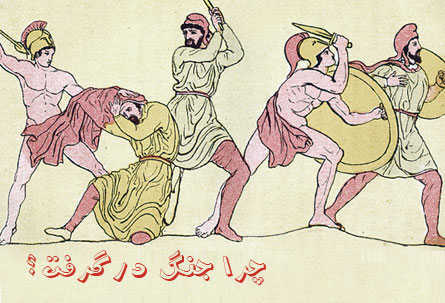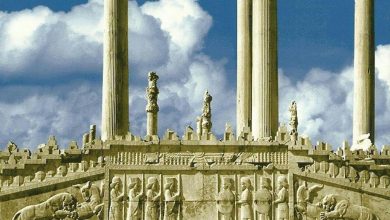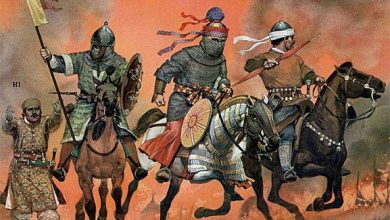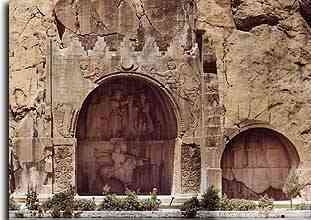War between Iran and Athens Darius campaign

During Darius' campaign to the land of the Scythians in Europe, Histiaeus, the ruler of Miletus, helped him.. He guarded the floating bridge of the Danube, which was built by the order of Darius. After returning from the land of the Scythians, Darius went to Sardis and invited Hystasius to reward him.. He asked Darius to give him the land of Myrkinus to build a city there. Darius brought him to his wish and he started building the city.
A little later, Megabazus revealed his concern about Histiaeus' progress. He wrote to Darius that if Histiaeus built a city in that wooded and silver-rich land and hired Greek mercenaries, he might start a rebellion.. Therefore, Darius asked Histiaeus to accompany him to Susa as his chief advisor. He also took Megabazus to Susa, and Othanes became the commander of the Asia Minor army in his place.
At this time, the administration of the city of Sardis was entrusted to Artaphrene, the brother of Darius, and the administration of the city of Miletus was entrusted to Aristagoras, the son-in-law and cousin of Histiaeus.. Aristagoras wanted to conquer the island of Naxos and other Cycladic islands in the Aegean Sea.. Therefore, he went to Artafrene and told him that it is very easy to reach these fertile islands.. Artaphrene, with the coordination of Darius, put an army under the command of Megapat at his disposal.
The campaign to Naxos was not successful, because Aristagoras and Megapates fell out. Aristagoras, who had paid a lot of money for this campaign and was afraid of Artaphrene's retribution, decided to raise a rebellion in Ionia.. He went to Sparta and told Cleomenes that the Persians had a lot of wealth and were not as capable in battle as the Greeks.. Despite these deceptive words, the king of Sparta asked him to leave that city as soon as possible.
Then Aristagoras went to Athens and addressed the general assembly of that city. He again spoke about the weakness of the Iranians in battle and the abundance of their wealth. He also said that the people of Miletus have Athenian roots and it is not appropriate to be under the rule of foreigners. Finally, he was able to bring the people of Athens with him with many promises. It seems like everyone says: "It is easier to deceive a group than to deceive an individual."
Two other factors also played a role in the Ionian revolt. One was the former ruler of Athens, Hippias, whom the people had thrown out of the city, and he spoke ill of the Athenians to Artaphrene.. He told Artaphrene that if he becomes the ruler of Athens again, he will take that city under the control of the Persians forever.. Another was Histiaeus, the father-in-law of Aristagoras, who was staying with Darius in Susa.. He incited his son-in-law to revolt by writing a letter.
Finally, the Athenians sent twenty warships to help the people of Ionia. The people of Eritrea also accompanied and sent five ships. Together with the army of Miletus under the command of his brother Aristagoras, they raided the city of Sardis, the throne of Lydia.. Artafrene, who was in the fortress of the city, was spared, but some grass huts and thatched roofs were burnt down.. The fire also reached one of the places of worship in the city and this caused the anger of the people of Lydia.
The Lydians and Persians of Sard launched a counterattack and drove the invaders out of the city.. Athenians stopped supporting Aristagoras and returned to their city. However, he helped the rebellion of the island of Cyprus and its surrounding lands. These rebellions were suppressed after one year by Dariush's expeditionary force. As Darius' army approached Miletus, Aristagoras fled and was killed in one of the cities of Thrace..
After suppressing the Ionian rebellion, Darius sent an army under the command of Datis and the son of Artaphrene to Greece.. This army opened the cities of Naxos and Eretria, and then, at the suggestion of Hippias, the former ruler of Athens, sailed to the plain of Marathon in the northeast of Athens.. The army of Athens and the army of Pars lined up against each other. The Persian army broke the heart of the Athenian army, but due to the resistance of the Athenians, they retreated into the ships and returned..
Herodotus says in one place that about half of the Athenian commanders were killed in Marathon and "how many other children of Athens and the most prominent of them were killed in this war". In another place he says that only 192 People from Athenians and about 6400 One of the Pars army was killed. Indeed, how is it possible that more than a third of the 20,000-strong army of Persia, but only 1/3 of them from the 10,000-strong army of Athens? 192 People killed?!
Aristagoras did not behave well, for after he had thrown all the land of Ionia into turmoil and embarked on a great campaign, as soon as events did not go his way, he tried to flee.. History of Herodotus, Volume V
Writer: Mr. Hassan Salari from Danesh Island






Hello and greetings.
In the picture, if you look carefully, you can see that the Greek soldiers are naked and the Persian soldiers are wearing clothes, which is a sign of the high culture of Iranians in that era..
Good luck.